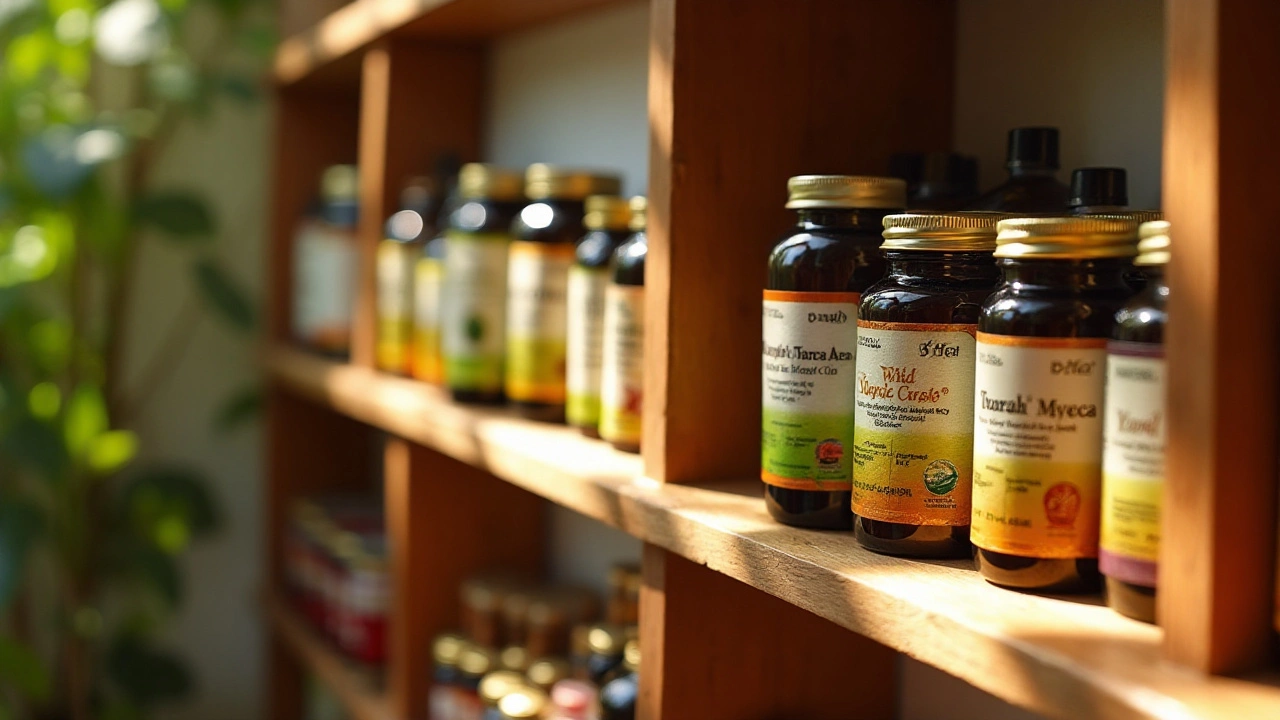In recent years, herbal supplements have emerged as a popular choice for those looking to enhance their health naturally. But with so many brands available, figuring out who to trust can feel overwhelming. Identifying reputable supplement companies is not just about brand recognition; it involves understanding their commitment to quality, transparency, and scientific backing.
This deep dive into herbal supplement brands aims to equip you with the knowledge to make informed choices. By exploring criteria that define a reliable company and highlighting some of the industry's most respected names, this guide offers a pathway to safer and more effective supplement use. Whether you're new to herbal remedies or a seasoned enthusiast, finding the right supplements can make all the difference in your wellness journey.
- Understanding Herbal Supplements
- Importance of Reputation in Supplement Companies
- Criteria for Choosing Reputable Brands
- Top Herbal Supplement Companies to Consider
- Common Ingredients and Their Benefits
- Tips for Safe Supplement Usage
Understanding Herbal Supplements
Herbal supplements have woven themselves into the tapestry of the health-conscious community, celebrated for their natural origin and perceived safer nature compared to synthetic alternatives. At their core, herbal supplements are products derived from plants that are used to enhance wellbeing. They can take various forms, including capsules, powders, teas, and extracts, each offering a different way to incorporate the raw power of nature into daily routines. Often, these supplements are marketed as boosters for various aspects of health, like improving immune function, reducing inflammation, or even aiding sleep. For the unfamiliar, it may come as a surprise that herbal remedies have been in use for centuries, forming the backbone of traditional medicinal practices worldwide. Ancient texts from Chinese, Ayurvedic, and Indigenous medicine highlight the extensive use of botanicals, providing a rich historical context for modern practices.
Today's herbal supplements are often a harmonious blend of time-honored traditions and modern science. Rigorous research is increasingly used to explore how these age-old remedies can fit into contemporary healthcare. Consumers show growing interest in products that not only promise benefits but are also backed by scientific evidence. This intersection of the ancient and the modern represents a significant trend in the wellness industry. The United States, for instance, is one of the largest markets for these products, with the National Institutes of Health observing that nearly 1 in 5 adults in the U.S. reported taking a herbal supplement in the past year. Such statistics underline the importance of understanding what makes a supplement both effective and safe.
Not all herbal supplements are created equal, which brings us to a key consideration: quality. It’s not unusual for consumers to face a dizzying array of choices at their local health store or online, where labels often promise miraculous results. However, vetting these products for quality and safety is paramount. Consumers are encouraged to look beyond the packaging and delve into the product's sourcing, manufacturing practices, and the company's transparency. Certifications like USDA Organic or Non-GMO Project Verified can add a layer of trust when selecting supplements, although they are not the only indicators of a product's quality. Craftsmanship and careful formulation play vital roles in delivering benefits without adverse effects, which underscores the importance of choosing reputable brands.
"Herbs and botanicals have a longstanding tradition of use for supporting health and are generally considered safe when used appropriately. However, scientific validation of these practices is crucial," observes a researcher from the American Botanical Council.
Understanding the broader spectrum of ingredients used in these supplements can also enhance one's decision-making. Some common ingredients include turmeric, known for its anti-inflammatory properties, echinacea, which is often used to boost the immune system, and ginkgo biloba, reputed for enhancing cognitive function. Knowing the role and potential benefits of these ingredients not only aids in selecting the right products but also empowers consumers to tailor their supplements to their specific health needs. Moreover, staying informed about potential interactions with medications or other supplements is essential, making it advisable for users to consult healthcare professionals before starting any new regimen. The journey towards better health through herbal supplements is one best taken with informed steps, considering both tradition and contemporary scientific insights.
Importance of Reputation in Supplement Companies
When it comes to herbal supplements, reputation is more than just a name; it's the cornerstone of trust and efficacy. In an industry where regulatory oversight can sometimes vary, the integrity of a company becomes crucial. A respected reputation often stems from consistent product quality, transparent business practices, and a solid track record of safety and effectiveness. Customers are becoming increasingly savvy, demanding proof of both ethical practices and tangible benefits, which forces companies to meet higher standards or risk losing their market share.
Reputation in the natural health industry is also built on scientific backing and rigorous testing. Many reputable supplement companies invest in clinical trials and publish their findings in peer-reviewed journals. This not only establishes credibility but also reassures consumers that the product formulations are both safe and beneficial. According to a study published in the Herbal Drug Research journal, supplements from companies with robust scientific support show significantly higher efficacy in trials.
Another compelling reason reputation matters is consumer protection. Manufacturing standards can vary wildly, with some companies cutting corners by using lower-quality ingredients or failing to properly test for contaminants. A trusted brand invests in Good Manufacturing Practices (GMP) certification, ensuring each step from sourcing to packaging meets strict guidelines. As Dr. Marion Nestle, a renowned nutritionist, once noted:
"The credibility of dietary supplements rests upon the integrity of its ingredient sourcing and manufacturing processes."This is why learning about the company’s sourcing methods and testing protocols can provide invaluable insights into their overall reliability.
Moreover, first-rate customer service and openness to consumer feedback contribute heavily to a company's standing in the industry. Companies that promptly address customer concerns and transparently provide ingredient information and certifications tend to foster greater loyalty and trust. Today's consumers are not shy to voice their opinions in reviews and social media platforms, where any questionable behavior can quickly erode a company's reputation. Therefore, consistent engagement and transparency are more important than ever for maintaining consumer trust.
In short, the reputation of a trusted company in the herbal supplements sector is a reflection of their commitment to providing products that are not only effective but also safe and responsibly produced. The proactive steps these companies take to maintain their reputation can often be seen as a benchmark for quality among their peers, setting industry standards that protect and empower consumers.

Criteria for Choosing Reputable Brands
When selecting herbal supplements, the process requires a keen eye and a thoughtful approach to identify reputable brands you can trust. With the market flooded with options, not all supplements are created equal, and understanding what sets reliable brands apart is crucial. One of the major factors to consider is the company’s commitment to transparency. Brands that are open about their manufacturing processes and willing to provide detailed information about their ingredient sourcing tend to be more trustworthy. Such transparency often indicates a company’s confidence in the quality and safety of its products.
It’s also important to look for certifications from recognized health authorities. These may include certifications from organizations like NSF International or the United States Pharmacopeia (USP). These entities conduct rigorous testing to ensure that supplements meet high standards of quality and purity. Supporting this, a report by Consumer Reports has highlighted the importance of such certifications, noting that they reduce the likelihood of contamination and mislabeling. Knowing that a product has been vetted by independent testers provides significant peace of mind for consumers.
Equally essential is the level of scientific research backing a brand's product claims. Companies with robust scientific foundations invest in clinical trials and peer-reviewed studies to substantiate their claims. Additionally, reputable brands typically maintain a team of qualified experts, including herbalists and health professionals, who guide the research and development process. These companies often publish the findings in well-respected journals, sharing their data openly with the public. This commitment to science ensures that you are not just taking a supplement on faith but with an understanding of its potential benefits.
The sourcing of ingredients is another pillar of quality. High-caliber brands prioritize using sustainably harvested and organic herbs, ensuring that their products are as natural and potent as they claim. This practice not only benefits the environment but also enhances the purity and effectiveness of supplements. Engaging stories from suppliers about their partnerships with local farmers and their dedication to ethical practices add a layer of trust and warmth to their brand image. Companies like Gaia Herbs, for instance, have been praised for their farm-to-bottle transparency, showing consumers exactly where their ingredients come from.
An often overlooked aspect is the customer service experience. Good brands are responsive and eager to engage with their customers. They provide clear avenues for you to reach them, whether through helplines, email, or social media. This level of support can be a reliable indicator of a company's interest in ensuring consumer satisfaction. Engaging with customers through honest dialogue reflects a company's commitment not only to its products but to the community it serves as well.
Lastly, consider the brand's track record and reputation within the industry. A company with a solid history of reliable products will often have garnered positive reviews and testimonials from consumers as well as endorsements from trusted sources. A brand’s longevity can be a testament to its ability to consistently meet consumer expectations. Checking resources like Healthline or even forums where people share their personal experiences can be incredibly valuable when evaluating which brands to trust and try. Remember, a well-reputed brand invests in all these areas consistently to deliver quality that stands the test of time.
Top Herbal Supplement Companies to Consider
In the bustling world of herbal supplements, amid all the choices, a few brands stand out, celebrated for their dedication to quality and innovation. At the forefront is Gaia Herbs, a company that has made an indelible mark by prioritizing sustainability and transparency. Their commitment is reflected in their traceability program, which allows consumers to see the origin and journey of every herb used in their products. This feature not only boosts consumer confidence but also sets a standard for the industry. Gaia's emphasis on potency and purity is backed by rigorous testing, ensuring that each capsule or extract is free from contaminants and true to its claims.
Another notable name is Nature's Bounty, which has carved its niche with a focus on affordability without compromising quality. Many users appreciate their comprehensive range of products that cater to various health needs. Their research-backed formulations and adherence to Good Manufacturing Practices (GMP) provide a reliable choice for millions seeking health supplements. Nature's Bounty’s partnerships with respected research institutions ensure that their product development is both innovative and scientifically sound. The brand's longevity in the market is a testament to its ability to adapt and continue delivering value to its customers.
A slightly different yet equally respected player is NOW Foods, a family-owned business that has become a favorite for health enthusiasts. Their commitment to environmental responsibility and community involvement enhances their reputation as a socially responsible brand. NOW Foods offers an impressive variety of natural health products and is praised for its transparency. Detailed lab results for their products are available to the public, adding another layer of trust. Their manufacturing focuses not only on wellness but also on reducing their carbon footprint, which resonates with the environmentally conscious consumer.
"Quality control is integral in ensuring consumers get exactly what they're promised on the label. It's about integrity," stated John Boyd, a healthcare science expert, highlighting the importance of choosing brands like those mentioned that prioritize these aspects.
A newer entrant making waves is Herbalife Nutrition, primarily known for its personalized approach to health and wellness. Their unique distribution model involves a network of wellness coaches who provide personalized guidance, making their supplements part of a broader lifestyle change. This approach is particularly effective for those who prefer a guided journey in their quest for better health. Although Herbalife has faced scrutiny in the past, its renewed focus on transparency and product safety has revitalized its image, gaining favor among new and seasoned users alike.
These companies exemplify what it means to be a trusted company in the competitive supplement industry. By focusing on rigorous testing, transparency, and consumer education, they help set industry standards and build consumer trust. This trust is crucial as the market is flooded with less reputable options promising quick results without backing them up with solid practice. So, when you're next at the health store aisle, considering these names could lead you towards better health and peace of mind.

Common Ingredients and Their Benefits
When it comes to herbal supplements, not all ingredients are created equal. It's important to understand the unique properties of each herb because these natural substances can play a vital role in managing various health conditions. For those venturing into the world of herbal supplements, knowing the benefits can significantly enhance your experience and effectiveness in using them.
Ginseng, for instance, is a popular herb known for its ability to boost energy levels and improve cognitive function. This root, often used in Asian medicine, is said to promote mental clarity and reduce the effects of stress. Studies have shown that people who consume ginseng regularly report improved mental performance and mood. Natural health practitioners often recommend it for those experiencing fatigue and mental fog. Another staple in herbal therapy is Turmeric, widely acclaimed for its anti-inflammatory properties. Curcumin, the active ingredient in turmeric, is a powerful antioxidant that can mitigate the effects of chronic inflammation, a known precursor to numerous diseases.
According to Dr. Michael Greger, “The anti-inflammatory effects of turmeric are so effective that it’s being researched as an alternative treatment for various inflammatory conditions.”
Chamomile, on the other hand, is a go-to herb for calming nerves and inducing sleep. From ancient Egyptians to current wellness enthusiasts, chamomile has maintained its repute for promoting relaxation and tackling insomnia. Studies indicate that drinking chamomile tea can lead to an improved sleep cycle and reduced symptoms of anxiety. When combined with other soothing herbs like lavender, it can be even more potent.
Let's not forget the potency of Echinacea, frequently relied upon for supporting the immune system. This flowering plant is most beneficial during the cold and flu season due to its ability to boost immune defenses and reduce the duration of respiratory infections. Some clinical trials revealed that those consuming Echinacea supplements witnessed shorter and less severe cold episodes. Another beneficial herb is Ashwagandha, known for its adaptogenic properties, which means it helps the body adapt to stress by modulating cortisol levels. Regular consumption of Ashwagandha is linked to enhanced stamina and vitality.
For those looking for heart support, Hawthorn Berry is a noteworthy mention. It has been associated with lowering blood pressure and improving heart function by acting as a vasodilator, which improves circulation. Studies have supported Hawthorn’s benefits in heart health, demonstrating how it can reduce symptoms of heart failure. It's crucial to approach these herbs with understanding as they're quite potent. Consulting with a trusted healthcare provider can help tailor supplement use to individual needs.
| Herb | Primary Benefit | Form |
|---|---|---|
| Ginseng | Boosts energy and mental clarity | Capsules, teas |
| Turmeric | Reduces inflammation | Powder, tablets |
| Chamomile | Induces relaxation and sleep | Teas, capsules |
Tips for Safe Supplement Usage
Navigating the world of herbal supplements requires a careful and thoughtful approach to ensure that your journey into natural health is both beneficial and risk-free. Safety comes from not only selecting trustworthy brands but also understanding how to use these products responsibly. Start by consulting with a healthcare professional, especially if you have existing health conditions or take other medications. Professionals can offer insights into potential interactions and the best options tailored to your health profile.
While many view herbal supplements as a natural and thus safer option, it’s crucial to remember that natural does not inherently mean without risk. Research is your best ally here. Take the time to read labels thoroughly, focusing on the recommended dosage, as overconsumption can lead to adverse effects. Ensure the product's quality by checking for verified third-party lab testing results. This independent verification can confirm the potency and purity of the supplement you intend to use.
Another key factor is sourcing supplements from reputable brands. Brands with a strong reputation often maintain rigorous quality control processes and offer full transparency about their ingredient sourcing practices. Opt for those that provide detailed ingredient lists, along with their potential benefits and side effects. Customers' reviews and testimonials can also shed light on other users' real-world experiences, offering practical insight into product effectiveness and any side effects experienced.
Dr. Mary McDigal, a herbal supplement researcher, once stated, "Understanding your body's needs and taking supplements that complement them, rather than replace nutritional gaps without cause, is fundamental to safe usage." This highlights the importance of tailoring supplement usage to genuine health needs rather than perceived benefits.
Safety also extends to storage. Herbal supplements should be kept in a cool, dry place away from direct sunlight to prevent degradation. Check expiration dates rigorously, as expired supplements can lose efficacy or pose health risks. Organizations such as the Consumer Lab and the U.S. Pharmacopeia offer certifications and reports that can guide you toward safe choices.
Educating yourself on specific herbal ingredients can unravel a wealth of knowledge that aids in making informed decisions. For example, ginseng is commonly used for energy enhancement but can interfere with certain medications. Awareness of how your chosen supplements work within the body's system is crucial. In case you start experiencing unusual symptoms or side effects, it's wise to stop usage and consult your healthcare provider promptly.
